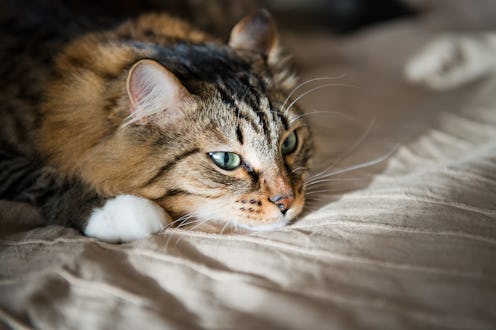
Cats and dogs might be animals, but just like us humans, they are capable of feeling a range of different emotions. You can tell when your pet is excited, anxious, scared, angry, or feeling calm, and similarly, you can also tell when their feeling depressed and sad. If you have recently lost a pet in your household, you might notice that your remaining pets seem to be grieving — that's because that's exactly what they're doing. You may be devastated because you lost a fur baby, and they are devastated because they lost a friend and close companion. It's not fun to watch this happen, and it's important to put aside your own feelings enough to help them through it, as they really need you in this moment. It's essential to know how to soothe pets who are grieving, rather than ignoring it.
According to Healthy Pets, your pet will have a "distress reaction" when the other pet dies. Signs of this could include a change in sleeping and eating habits, a lack of interest in the things they usually love, a reluctance to be alone or without you, and a sad habit of wandering the house and looking for their deceased friend. Again, this isn't something you just want to ignore, assuming your pet can get through it on their own. They need you to be there for them, and there are specific ways to do that without harming them further. Below are a few tips on how to help your grieving pet through their loss:
1Don't Spend Too Much Time Comforting Them
When you notice your pet is grieving, your first reaction is that you're going to want to comfort them - maybe give them extra snuggles when they look really sad, sneak them a treat to cheer them up, or just spend a lot more time with them. Unfortunately, you really shouldn't do this. According to Healthy Pets, giving your pet attention when they're doing something they shouldn't be doing - even grieving - is reinforcing their behavior. You don't want to reward their distress actions, because they might keep them up just to keep getting your attention.
2Help Them Stay Busy
Instead of comforting your pet with hugs, you should try keeping your pet busy and active. Pet Health Network says, "Exercise is the best antidepressant and stress reliever for both humans animals." Take your dog on some longer walks, buy a stimulating new toy for your cat, and just be sure to keep them busy.
3Keep Up The Same Routine As Always
If there is one thing pets love, it's a steady routine. They do best when they know exactly what to expect, and this won't change when they're grieving - in fact, they will crave that routine even more. You might be grieving too, and that might make you want to sleep in later and change their feeding time, or forgo a daily afternoon walk for laying on the couch. Don't do this. You both need to stay busy, and their routine is so important. Changing it up will make things worse for them.
4Try To Make Them Eat If Their Appetite Seems To Be Diminished
One of the signs of grief in a pet is a loss or change in appetite. You might notice that your pet is snubbing their food or barely eating anything. That's normal, but it's important for you not to indulge it. Healthy Pets says to continue feeding them the same food at the same times, and to store what they don't eat for the next meal. And if their appetite doesn't pick up after a few days, call your vet.
5Try Not To Get Too Emotional In Front Of Them
If you are also grieving, it's normal for you to express your emotions in an obvious way. It can even be healthy for you to do so. But if you're crying really hard or expressing yourself very intensely, try not to do it in front of your pet. As Catster points out, "Cats are very sensitive and respond to our emotions and feelings. The way we grieve can escalate and lengthen our little ones’ own grief process." The same can be said for dogs.
6Don't Replace A Lost Pet Right Away
If you've just lost a beloved pet, and you and your remaining pet are both devastated, you might assume that a new furry friend is just what you both need. This isn't true, at least for your pet. The Santa Barbara Independent says you should wait at least three months so that your pet can adjust to their new way of life without their friend, adding, "Adopting a new puppy or kitten may not be the best idea since a hyperactive animal can be physically and emotionally stressful on your grieving pet."
7Be Patient
It's devastating to see your pet deal with grief, and you might want to do anything you can to stop it right away. But just like it is with humans, time is the biggest healer for a broken hearted pet. Pet Health Network says that clinical research has shown that the first two weeks will be worst, and things will slowly get better as time goes on. Just give them time to heal.
8Monitor Their Health
While you want to give your pets time, you also want to continue to monitor them to make sure their physical health is okay. Pet Health Network says, "The stress and anxiety associated with depression can push a borderline failing organ system over the edge and into life-threatening crisis." Monitor the health of all pets, but especially the older ones. And Catster says that if your cat isn't eating, they could be at risk for developing feline hepatic lipidosis, a serious and potentially fatal condition.